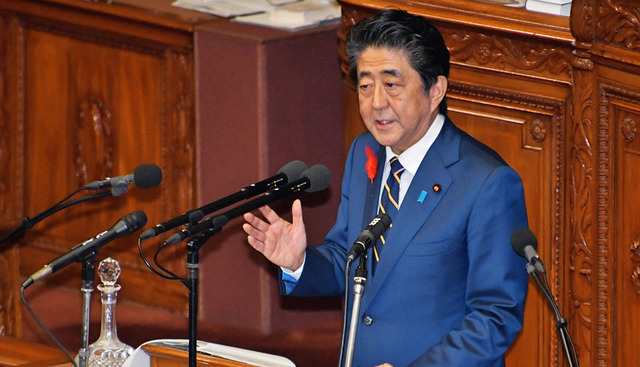Posted on : Oct.11,2019 16:11 KST
 |
|
Japanese Prime Minister Shinzo Abe addresses the Japanese House of Representatives on Oct. 4. (Yonhap News)
|
It’s been 100 days since Japan’s Abe administration imposed export controls on South Korea. On July 4, Prime Minister Shinzo Abe tightened controls on exports of three key materials for semiconductors and displays. This act had no precedent in the decades that have passed since South Korea and Japan normalized their diplomatic relations in 1965. Then on Aug. 28, Abe went a step further by removing South Korea from Japan’s white list of countries that enjoy expedited screening for the export of strategic materials.
The Abe administration’s export controls are clearly economic retribution, which contravene both the principles of free trade and the rules of the World Trade Organization (WTO). Abe has used trade as a bludgeon to retaliate against the South Korean Supreme Court’s ruling awarding compensation to the victims of forced labor during the Japanese colonial occupation, a ruling that is unrelated to trade issues. That’s why international opinion has been critical of the Abe administration’s export controls. In response, the South Korean government decided on Aug. 22 to terminate its GSOMA intelligence-sharing agreement with Japan and removed Japan from its own white list on Sept. 18.
Looking back over the past 100 days, the Abe administration’s export controls have caused more harm to Japan than to South Korea. The Japanese government’s unfair economic retribution has triggered a boycott in the South Korean public that has caused snowballing losses in tourism and other related Japanese industries. In effect, warnings that Japan’s rash export controls were a counterproductive move that would come back to haunt it are starting to come true.
On several occasions over the past months, including South Korean President Moon Jae-in’s commemorative speech on Liberation Day, Aug. 15, the South Korean government has asked Japan to resolve this situation through diplomacy and dialogue. But there are no indications that the Abe administration has changed its attitude.
Amid these circumstances, bilateral deliberations between director-generals in the South Korean and Japanese government are being held in Geneva, Switzerland, on Oct. 11, representing the first stage in WTO arbitration of the export controls. These deliberations are typically managed by section chiefs, but the two countries reportedly upgraded their formality to director-general in their preliminary discussion. Since this is the first meeting between high-level trade officials since the export controls were imposed, we hope their discussion will be productive.
Furthermore, South Korean Prime Minister Lee Nak-yeon is reportedly likely to represent the government at the enthronement ceremony of Japanese Emperor Naruhito on Oct. 22. As the deputy chair of the Korea-Japan Parliamentarians’ Union, Lee is one of the government’s best-known experts on Japan. If a meeting is held between Lee and Abe, it could be an important starting point for finding a solution.
As close neighbors, South Korea and Japan are fated to work together toward their mutual prosperity. Even if not for their own interests, they ought to cooperate closely for peace in Northeast Asia. Continuing this pointless conflict doesn’t benefit anyone. Since Japan started the conflict, it ought to have the grace to change its attitude, and retracting the export controls is the first step toward doing so.
Please direct comments or questions to [english@hani.co.kr]






